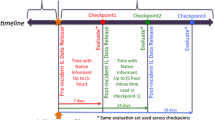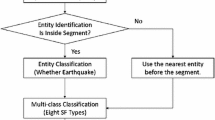Abstract
This paper describes the Situation Frame extraction pipeline developed by team ELISA as a part of the DARPA Low Resource Languages for Emergent Incidents program. Situation Frames are structures describing humanitarian needs, including the type of need and the location affected by it. Situation Frames need to be extracted from text or speech audio in a low resource scenario where little data, including no annotated data, are available for the target language. Our Situation Frame pipeline is the final step of the overall ELISA processing pipeline and accepts as inputs the outputs of the ELISA machine translation and named entity recognition components. The inputs are processed by a combination of neural networks to detect the types of needs mentioned in each document and a second post-processing step connects needs to locations. The resulting Situation Frame system was used during the first yearly evaluation on extracting Situation Frames from text, producing encouraging results and was later successfully adapted to the speech audio version of the same task.





Similar content being viewed by others
References
Deerwester S, Dumais ST, Furnas GW, Landauer TK, Harshman R (1990) Indexing by latent semantic analysis. J Am Soc Inf Sci 41(6):391–407
Hermjakob U, Li Q, Marcu D, May J, Mielke S, Pourdamghani N, Pust M, Shi X, Knight K, Levinboim T, Murray K, Chiang D, Zhang B, Pan X, Lu D, Lin Y, Ji H (2017) Incident-driven machine translation and name tagging for low-resource languages. Machine translation special issue : NLP in low-resource languages
Horwood G, Bartrem K (2016) Lorelei humanitarian assistance/disaster relief lexicon v1 [data file]. Leidos, Inc. Distributed through https://xnet2.nextcentury.com/confluence/pages/viewpage.action?pageId=10650520
Lai S, Xu L, Liu K, Zhao J (2015) Recurrent convolutional neural networks for text classification. In: Proceedings of the twenty-ninth AAAI conference on artificial intelligence, pp 2267–2273
LORELEI (2015) DARPA LORELEI website. http://www.darpa.mil/program/low-resource-languages-for-emergent-incidents. Retrieved 25 Oct 2015
Malandrakis N, Glembek O, Narayanan S (2017) Extracting situation frames from non-english speech: evaluation framework and pilot results. In: Proceedings of Interspeech
Pan X, Zhang B, May J, Nothman J, Knight K, Ji H (2017) Cross-lingual name tagging and linking for 282 languages. In: Proceedings of ACL
Papadopoulos P, Travadi R, Vaz C, Malandrakis N, Hermjakob U, Pourdamghani N, Pust M, Zhang B, Pan X, Lu D, Lin Y, Glembek O, Baskar MK, Karafiát M, Burget L, May J, Ji H, Knight K, Narayanan S (2017) Team ELISA system for DARPA LORELEI speech evaluation 2016. In: Proceedings of Interspeech
Pennington J, Socher R, Manning C (2014) Glove: global vectors for word representation. In: Proceedings of the 2014 conference on empirical methods in natural language processing (EMNLP). Association for Computational Linguistics, pp 1532–1543
ReliefWeb (2016) ReliefWeb website. http://reliefweb.int/. Retrieved 31 Mar 2016
Strassel S, Tracey J (2016) Lorelei language packs: data, tools, and resources for technology development in low resource languages. In: Proceedings of LREC, pp 3273–3280
Tong A, Diduch L, Fiscus J, Haghpanah Y, Huang S, Joy D, Peterson K, Soboroff I (2017) Overview of the nist 2016 lorehlt evaluation. Machine translation special issue: NLP in low-resource languages
Vieweg S, Hughes AL, Starbird K, Palen L (2010) Microblogging during two natural hazards events: what twitter may contribute to situational awareness. In: Proceedings of the SIGCHI conference on human factors in computing systems, pp 1079–1088
Zhang B, Pan X, Wang T, Vaswani A, Ji H, Knight K, Marcu D (2016) Name tagging for low-resource incident languages based on expectation-driven learning. In: Proceedings of the NAACL-HLT, pp 249–259
Acknowledgements
This work was supported by the Defense Advanced Research Projects Agency (DARPA) under Contract No. HR0011-15-C-0115 with the University of Southern California. Any opinions, findings and conclusions or recommendations expressed in this material are those of the author(s) and do not necessarily reflect the views of DARPA.
Author information
Authors and Affiliations
Corresponding author
Rights and permissions
About this article
Cite this article
Malandrakis, N., Ramakrishna, A., Martinez, V. et al. The ELISA Situation Frame extraction for low resource languages pipeline for LoReHLT’2016. Machine Translation 32, 127–142 (2018). https://doi.org/10.1007/s10590-017-9204-4
Received:
Accepted:
Published:
Issue Date:
DOI: https://doi.org/10.1007/s10590-017-9204-4




